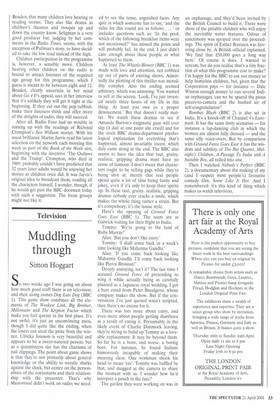Muddling through
Simon Hoggart
So two weeks ago I was going on about how much good stuff there is on television, and then along comes Dog Eats Dog (BBC 1). This game show combines all the elements of The Weakest Link, Big Brother, Millionaire and The Ktypton Factor which make you feel queasy in the first place. It's not awful; it's just an unconvincing mess, though I did quite like the ending, when the losers can steal the prize from the winner. Ulricka Jonsson is very beautiful and appears to be a sweet-natured person, but as a quizmistress she has the charisma of nail clippings. The point about game shows is that they're not primarily about general knowledge or the ability to wrestle sharks against the clock, but centre on the personalities of the contestants and their relationship with the presenter. That's why Mastermind didn't work on radio; we need
ed to see the tense, anguished faces. Any quiz in which someone has to say, 'and the rules for this round are as follows ... ' or includes questions such as: 'In the pool, which of the following breakfast items were not mentioned?' has missed the point and will probably fail. In the end, I just didn't care enough about these people or what happened to them.
At least The Whistle-Blower (BBC 1) was made with love and attention, not cobbled up out of parts of existing shows. Admittedly the plotting of this thriller was incredibly complex. Also the ending seemed arbitrary, which was annoying. You wanted to yell at the screen, 'Look, I've just invested nearly three hours of my life in this thing. At least you owe us a proper denouement.' But that doesn't really matter. We watch these dramas to see if Amanda Burton's enigmatic gaze will ever slip (it did; at one point she cried) and for the stock BBC drama-department psychological explanation for everything that's happened, almost invariably incest, which duly came along at the end. The BBC also seems to have the idea that taut, grainy, realistic, gripping drama must have no sense of humour, I don't mean that characters ought to be telling gags while they're being shot at; merely that real people spend quite a lot of time being funny and jokey, even if it's only to keep their spirits up. In these taut, grainy, realistic, gripping dramas nobody ever cracks a smile, which makes the whole thing rather a strain. But it's compulsory; it's the house style.
Here's the opening of Ground Force Goes East (BBC 1). The team are at Gatwick waiting for their flight to India.
Tommy: 'We're going to the land of Ruby Murray!'
Alan: 'But you don't like curry.'
Tommy: 'I shall come back in a week's time looking like Mahatma Gandhi.'
Alan: 'If you come back looking like Mahatma Gandhi, I'll come back looking like Pierce Brosnan!'
Deeply annoying, isn't it? The last time I accused Ground Force of pretending to wing it while actually being as carefully planned as a Japanese royal wedding, I got a hurt email from Peter Bazalgette, whose company makes the show. But if the conversation I've just quoted wasn't scripted, then there's no excuse for it.
There was lots more about curry, and even more about people getting diarrhoea as a result of eating it. Presumably in the likely event of Charlie Dimmock leaving, they-re trying to build up Tommy as a loveable replacement. It may be beyond them. So far he is a boor, and worse, a boring boor. For instance, he found Indians humorously incapable of making their meaning clear. One workman shook his head to mean 'yes'. Tommy was baffled by that, and mugged at the camera to share the moment with us. I wonder how he'd interpret a punch in the face?
The garden they were working on was in an orphanage, and they'd been invited by the British Council to build it. There were shots of the pitiable children who will enjoy the inevitable water features. Odour of sanctimony was sprayed over the proceedings. The spirit of Esther Rantzen was hovering close by. A British official explained, 'We find that £50,000 goes a long way here.' Of course it does, I wanted to scream, but do you realise that's a tiny fraction of what this programme cost to make? I'm happy for the BBC to use our money to help homeless children, but, given that the Corporation pays — for instance — Dale Winton enough money to run several Indian orphanages, can we be spared the pious pieces-to-camera and the hushed air of self-congratulation?
Bombay Blush (BBC 2) is also set in India. It's a knock-off of Channel 4's Eurotrash. It has the same dotty scenarios — for instance a lap-dancing club in which the women are almost fully dressed — and the same silly voice-overs. But by comparison with Ground Force Goes East it has the wisdom and subtlety of The Raj Quartet, Midnight's Children, A Passage To India and A Suitable Boy, all rolled into one.
Then I watched Nobody's Fetfect (BBC 2), a documentary about the making of my (and I suspect most people's) favourite comedy film, Some Like It Hot. And I remembered: it's this kind of thing which makes us watch television.


































































 Previous page
Previous page